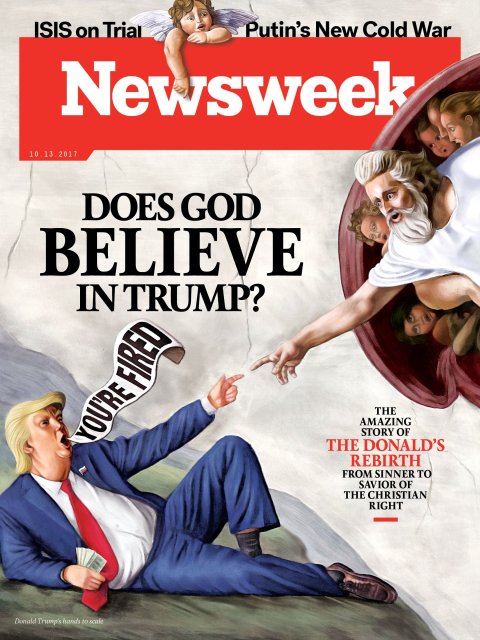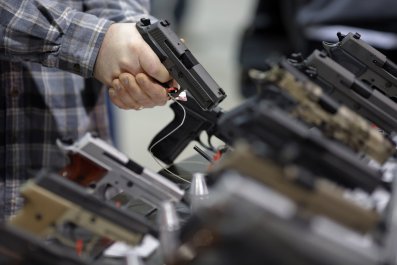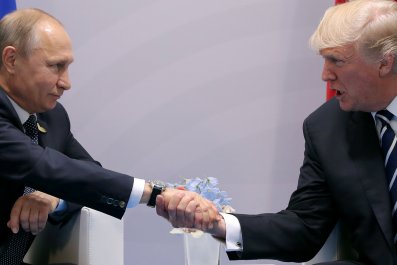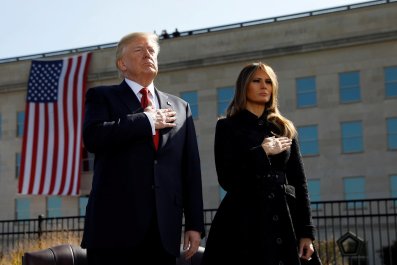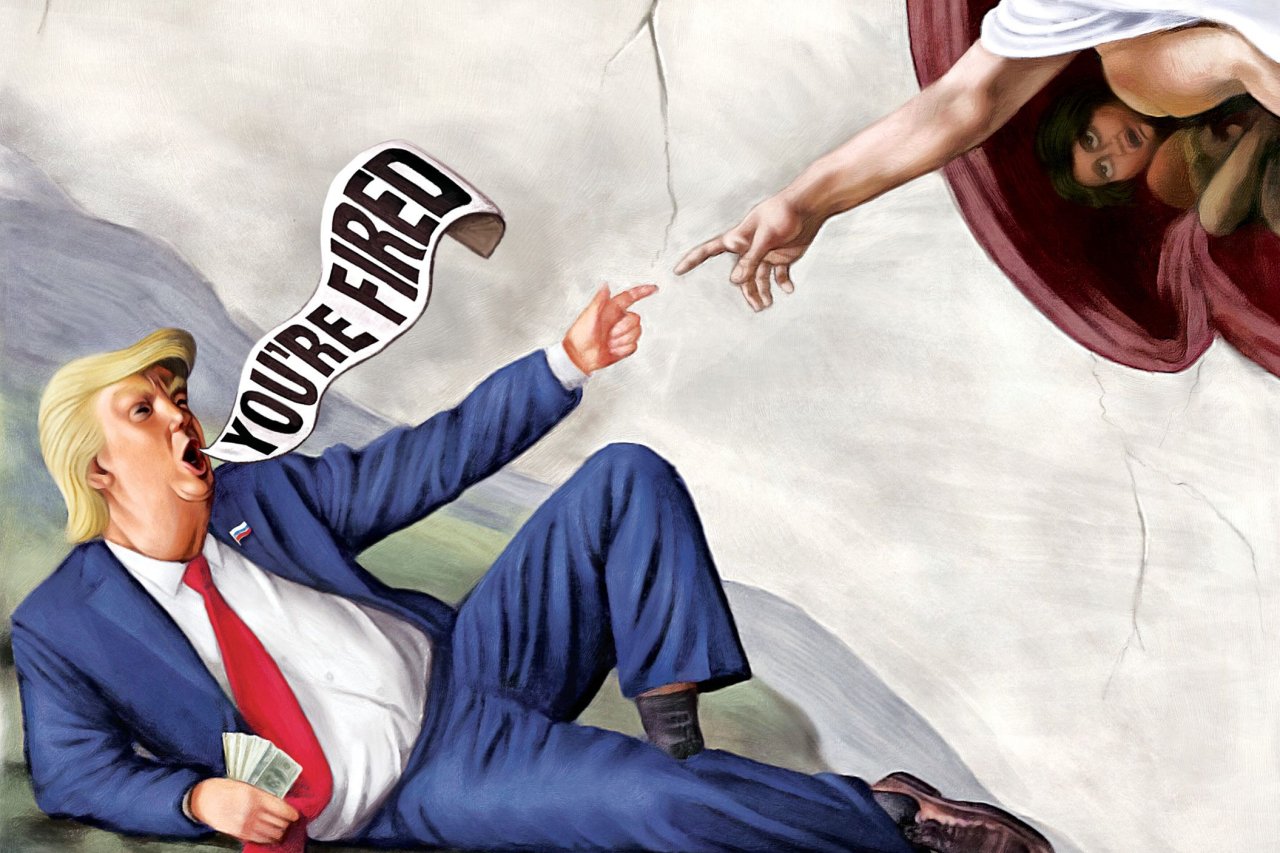
"When he lies, he speaks his native language, for he is a liar and the father of lies."
—John 8:44
As Hurricane Harvey inundated Houston and tens of thousands fled, good Samaritans emerged on the seething waters. Boat owners from as far away as Louisiana pushed all manner of craft into the deluge, steering down urban streets that had been transformed into rivers, risking their lives to rescue men, women and children. Furniture store owner Jim "Mattress Mack" McIngvale opened his showrooms to dozens of wet refugees and their pets for several nights. Even workers trapped in a bakery by the rising tide thought first of others—they used the time they were marooned to bake for the hungry and the homeless.
Such acts of bravery and charity were as uplifting as the megastorm was crushing. But that spirit of generosity was not universal. As more than 9,000 displaced people packed into the George R. Brown Convention Center—almost double its capacity—one very large, very warm, very dry and very Christian space remained shuttered. The Lakewood megachurch, whose 606,000-square-foot interior can hold 16,000 people, would not be offering shelter, millionaire pastor Joel Osteen said, because it was in danger of being flooded.
Although nosy reporters quickly discovered that his precious church was both accessible and bone-dry, neither God nor scribe could move Osteen to embrace the stranded multitudes. But Twitter did, in a spasm of scorn delivered with the hashtag #OpenTheDoors. (The church was a shelter, yes, but a tax shelter, wags said.) After 48 hours of public flogging, Osteen relented—just as the sun was coming out in Houston and the waters were receding, taking with them his saintly reputation.
Osteen's brand of closed-door Christianity is increasingly common on the conservative fringes of American fundamentalism, where profitability is considered next to godliness. Versions of that flinty theology, sometimes called prosperity gospel, dominate President Donald Trump's evangelical panel, 25 pastors and religious conservatives who have mostly dispensed with those Sunday school homilies about Jesus loving the sick and poor, and Jesus responding to attacks with a turn of the cheek. They preach that their Lord hates entitlements, from welfare to Obamacare, that climate change is the talk of pagan heretics and that their heavenly father is fine with nuclear first strikes, as long as it's America droppin' the hammer.
And many of them believe their mortal messiah is Donald J. Trump, long a sybaritic scion but now the man who has solemnly vowed to take America to the promised land of deregulation, tax breaks and resegregation.
An I for an I
Trump's long and sometimes confounding spiritual journey started in Jamaica, Queens, at the bite-sized First Presbyterian Church, and later, at the WASPy Marble Collegiate Church on Manhattan's Fifth Avenue, where prosperity prophet Norman Vincent Peale preached that you could think yourself to success. In 1952, Peale published The Power of Positive Thinking, a New York Times best-seller for 186 weeks that sold more than 5 million copies and was translated into 15 languages. That tome and his hailstorm of follow-up titles trained a generation of Americans to grin and fake it all the way to the bank. His theology was well summarized by the mantra Fred Trump pounded into his boy, Donald: "You are a killer. You are a king."
That nugget may have been as close as young Donald ever got to Scripture. During the recent presidential campaign, he called the biblical book Second Corinthians "Two Corinthians," a transgression on par with referring to the Holy Trinity as the Three Amigos. He has called Communion "my little wine" and "my little cracker." More alarming for the truly pious, he couldn't come up with a favorite Bible verse when asked during the campaign, except to say he liked the Old Testament's "an eye for an eye."
Trump also diverts from traditional Christianity in more significant ways. For one, he often boasts that he never asks for forgiveness, although that's a fundamental tenet of fundamentalist Protestants, who believe that all men are sinners in the eyes of God.
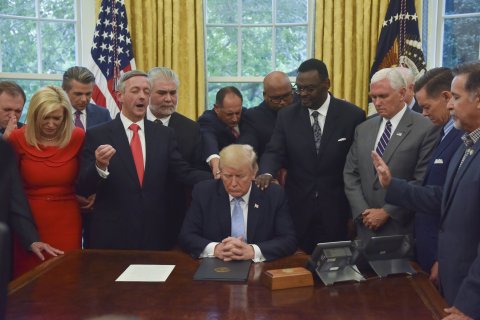
For many decades, Trump was the sweaty embodiment of the Manhattan libertine—a Studio 54 denizen who ran a modeling agency as his personal Tinder, and laughingly told Howard Stern that his Vietnam was avoiding STDs when he was a swingin' bachelor…and a swingin' married man. He wasn't known for his religious faith until sometime in the early 2000s, when he cold-called televangelist Paula White, another prosperity Christian, after seeing her on TV, and they became friends. (Like Trump, she has endured congressional and federal inquiries into her finances.) White soon owned a $3.5 million Trump Tower condo and spent time with Trump when she visited New York City. She later explained that she knew Trump was a true Christian partly because of the way he treated his employees.
In May 2011, Trump asked her to do a little work for him: deliver some religious leaders up to Trump Tower to counsel him on whether he should challenge Barack Obama for the presidency. The group talked with him for two and a half hours, including a 20-minute prayer session, and urged him to have faith in God during what they called the "evil process" of challenging Obama. After that confab, Trump apparently determined God was not ready for him to be in the White House, but four years later, he must have gotten the OK from on high, because he decided to run. The relationships he'd cultivated with White and the pastors who ministered to him in 2011 earned him favorable early coverage in the Christian media and access to the vast network of megachurches, and it all paid off in November 2016, when he was elected president of the United States. Evangelicals—a quarter of the American people—put him over the top, despite his "New York values."
Trump clearly appreciates that support and continues to curry favor with his faithful flock. On July 1, he headlined the Celebrate Freedom rally for two of his most ardent demographics: veterans and evangelicals. After the First Baptist Dallas choir premiered an original song, "Make America Great Again," the main act strode to the podium. "We are ooone nation, under God," the president crooned with the caramel delivery of a Vegas emcee introducing Liberace at the Sands. "In America, we don't worship government. We worship God!" Rapturous applause. "You will ne-eeehver be forgotten," he vowed. "We don't want to see God forced out of the public square, driven out of our schools or pushed out of our civic life. We wanna see prayers before football games, if they wanna give prayers!"
"And," he added, "we're gonna start saying 'merry Christmas' again!"
That Kennedy Center fête was the high point of an otherwise harrowing summer for Trump. The nationally televised event featured his most clean-cut supporters: no tattoos, no biker leather, no skinheads, no torches—just polite white men, women and children feasting on Christian chestnuts and patriotic red meat.
Trump delivered just what his crowd wanted to hear that day, mentioning God dozens of times, but there are reasons to question his sincerity and his piety. For example, the creators of a new database, Factba.se, of every recorded word Trump has uttered in public ran all that audio through a digital analysis that measures stress and found that he is most stressed when talking about what he now professes is his greatest love—God—and least stressed when he discusses what is allegedly his mortal enemy, The New York Times.
But perhaps he's still evolving spiritually. After all, Trump long pursued an aggressively secular life, but these days, the famously germaphobic president submits to a regular laying on of hands in the Oval Office. In a recent photograph shared by evangelical pastor Rodney Howard-Browne of one of these rituals, all eyes are squeezed shut as Trump adviser Omarosa Manigault, Vice President Mike Pence, Trump lawyer Michael Cohen and a group of visiting religious advisers summon the Holy Spirit. All eyes closed but for one pair—Trump is peeking.
He offered another glimpse into the depth of his piety when he veered off script in his acceptance speech last year at the Republican National Convention in Cleveland. His prepared remarks had him say: "At this moment, I would like to thank the evangelical community, who have been so good to me and so supportive." But what he actually said was: "At this moment, I would like to thank the evangelical community because, I will tell you what, the support they have given me—and I'm not sure I totally deserve it—has been so amazing. And has been such a big reason I'm here tonight."
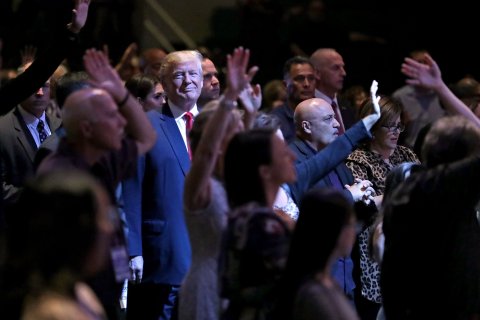
All modern presidents have had faith councils of one sort or another. They usually include representatives of many faiths (and races), and their job is to maintain ties between the White House and the nation's vast constellation of religious groups. But Trump's evangelical council is almost all white (one black) and dominated by evangelicals. Trump has repaid this fanboy congregation by putting eight white evangelicals in his God Squad of a Cabinet (Ben Carson, the ninth Cabinet evangelical, is black). And they have dispensed with secular expertise at almost every level. (Education Secretary Betsy DeVos, heiress to the Amway fortune, showed she was the right zealot for the job by using her family money in an attempt to demolish Michigan's public schools in favor of religious schools and home schooling.)
Fundamentalists now have an all-access pass to the highest levels of government, and Trump made their wish list a priority. One of his first acts as president was to order the IRS to lay off monitoring political donations to churches. Political pastors and billionaires alike loved it: Conservative donors can now bleach dark money donations through churches.
His other big concession to his devout army was picking Pence to be his running (and kneeling) mate. The uxorious Hoosier, whose political career seemed deader than Lazarus or Myspace two years ago, is now a heartbeat—or a Robert Mueller indictment— away from being leader of the free world.
The Race-Baiting Race to the Bottom
In August, Trump got a fire-and-brimstone baptism for saying there were "very fine people on both sides" of the riot in Charlottesville, Virginia, that white supremacists started. American businessmen recoiled and charities canceled bookings at his Mar-a-Lago resort, but his evangelical council was steadfast in its support. "Honored to serve @POTUS on his Faith Initiative Council," First Baptist Dallas Pastor Robert Jeffress tweeted. "He has done more in 6 mo. to protect religious liberty than any pres. in history." Paula White went on fellow televangelist Jim Bakker's show to announce that Trump was "raised up by God" to lead the country.
To historians, the evangelical leaders' response was no surprise, because they know racism was behind the emergence of evangelicals as a political force in America. "If you are looking for the core animating spark of the Christian-right movement, it's not abortion but private Christian universities not being able to have laws against interracial dating," says Robert Jones, head of the Public Religion Research Institute and the author of The End of White Christian America (Simon & Schuster, 2016). He knows that when the federal government forced integration on public schools in the South, white parents yanked their kids out and enrolled them in new church-run schools dubbed "segregation academies." The white flight was fast and devastating. In Mississippi, for example, the white population in the Holmes County school system dropped from 700 to 28 in year one of desegregation, and by the next year had dropped to zero.
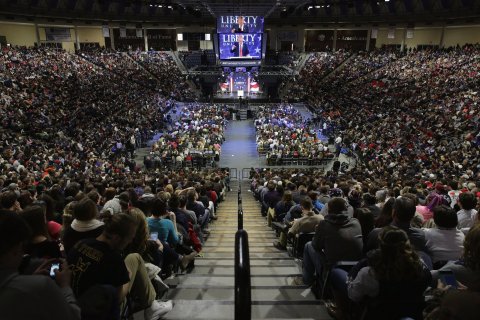
To curtail this trend, the IRS began to deny tax-exempt status to segregation academies. Bob Jones University, one of the biggest evangelical colleges in the country, faced losing its IRS-exempt status because of its ban on interracial dating. As racial panic spread, a Republican political genius named Paul Weyrich—with patronage from Western segregationist beer billionaire Joseph Coors—forged alliances with Southern religious leaders. According to William Martin, author of With God on Our Side: The Rise of the Religious Right in America, Weyrich met Jerry Falwell Sr. in the coffee shop of a Holiday Inn in Lynchburg, Virginia, in 1979. "Weyrich was saying to Falwell, 'There is a moral majority in this country that wants such and such,' and Falwell said, 'Back to where you started. What was that you said? You used a phrase.' Weyrich said, 'There is a moral majority…' Falwell says, 'That's it. That's what we'll call it. We'll form an organization, and that is the name we'll give it.'"
In the 1980 presidential election, Falwell's moral majority helped propel Ronald Reagan into the White House. Reagan knew what his God-fearing demographic really wanted, which is why he kicked off his campaign with a stump speech supporting states' rights at a fair in rural Mississippi. "States' rights" had been a rallying cry for Southern segregationists for decades, and in case anyone missed the coded message, Reagan delivered that speech just 7 miles from where three civil rights workers had been murdered in the 1960s. On the campaign trail, and many times while he was in the White House, Reagan also did a lot of grousing about "welfare queens."
Over the next few years, abortion and gay marriage became the issues Republican strategists used to enflame that moral majority and cattle-prod right-leaning Christians into the voting booth. Trump weaponized this cynical ploy on the campaign trail. He found it easy to abandon his long-held support of abortion and gay marriage if it meant sealing the covenant with his fervent fundamentalists.
The Kingdom of Trump
Trump's chief spiritual adviser is not his veep, that pious silver fox who says he never dines alone with a woman not his wife. That sacred duty falls to White, chair of the White House evangelical panel. She is thrice-married (currently wed to Journey rocker Jonathan Cain, whose "Don't Stop Believin'" was an '80s rock anthem) and preaches to millions on TV and, when she's back in Florida, to her smaller flock at the New Destiny Christian Center church in Apopka. White and her fellow prosperity theologians have put some white-out over the New Testament line that it is easier for a camel to pass through the eye of a needle than for a rich man to enter the kingdom of God. She prefers another biblical passage, "When you enter the land I am going to give you and you reap its harvest, bring to the priest a sheaf of the first grain you harvest" (Leviticus 23:10 NIV). Her webpage First Fruits 2017 is an online collection plate, decorated with a photograph of grapes, pomegranates and oranges, and click buttons labeled "Give your best first fruits offering today!" and "Send your prayer request today!" lead to forms for credit card payments.
(White's spokesman said she was unavailable for an interview with Newsweek.)
The next most prominent godly voice in Trump's White House is the Cabinet Bible study pastor, Ralph Drollinger, who preaches that Jesus—contrary to several millennia of church teaching—didn't really think you had to help the poor if you happen to be a member of Congress. In "Entitlement Programs Viewed Through the Lens of Scripture," a sermon from one of his weekly Bible study sessions, which he delivered last year on Capitol Hill, he told his high-level political congregants that the Bible "is clear" that caring for the poor is the responsibility of the family and the church, not the government. "Nowhere to be found in the NT is an explicit command for the Institution of the State to assume such a function," he wrote. "Jesus was only a role model to emulate."
In another teaching, "What Does the Bible Teach in Regards to Property Rights?" Drollinger wrote, "It's safe to say that God is a Capitalist, not a Communist."
(Drollinger's office declined Newsweek's request for an interview, explaining that he was on an annual 200-mile hike in the Sierras.)
Drollinger endeared himself to Trump last year when he called on him to create a "benevolent dictatorship." This anti-democratic impulse was familiar to people who study evangelicals. Political scientists have noted a growing authoritarian trend in American voters, and in Trump voters in particular. A 2011 meta-analysis of hundreds of studies involving thousands of people found that "fundamentalism correlated positively with authoritarianism, ethnocentrism, militarism, and prejudice."
Drollinger's fondness for abject subservience even extends to climate change. He and several of Trump's theologians preach that even if the world is heating up, it's presumptuously sinful to believe human activities have anything to do with it. Says Drollinger: "To think that man can alter the earth's ecosystem—when God remains omniscient, omnipresent and omnipotent in the current affairs of mankind—is to more than subtly espouse an ultra-hubristic, secular worldview relative to the supremacy and importance of man."
This fossil-fuel-loving fringe of the evangelical movement—which includes Environmental Protection Agency Director Scott Pruitt—preaches that the many green Christian movements are born of a spiritual deception and are evidence of a "demonic worldview," according to James Wanliss, associate professors of physics at Presbyterian College in South Carolina, who claims that environmentalists aim for "the reconstruction of a pagan world order."
To which Senator James Mountain Inhofe says amen. Inhofe, the powerful chair of the Senate Committee on Environment and Public Works and one of the Capitol's most devoted climate change deniers, lays the responsibility for Earth's climate on God, and God alone. "God's still up there," he said on a Christian radio show in 2015. "The arrogance of people to think that we human beings would be able to change what he is doing in the climate is, to me, outrageous."
Thou Silver-Tongued Tweeter
It's now obvious that Trump got an extraordinary return on investment when he cozied up to evangelicals in 2011, but what did they see in him? His biography until quite late in life would seem to be antithetical to everything they believe. Jones, of the Public Religion Research Institute, thinks the answer lies in the 2015 Supreme Court ruling legalizing gay marriage. "Local Democrats and progressives wildly underestimated the nuclear event that the same-sex marriage decision was for conservative white Christians," he says. "It was so at the heart of their political engagement. They had pushed all their resources into the fight, and they lost decisively in courts and in public opinion."
Among the many miracles Trump performed during his campaign was exploiting white conservative Christian fear. White Christians really are losing demographic ground, if not power. America won't be theirs for much longer because they are a shrinking portion of the electorate. But, as Trump showed to astonishing effect, they still turn out to vote at higher rates than other, larger demographic groups. And that gives their views greater weight. In 2008, white evangelicals were 21 percent of the population but made up 26 percent of the vote, Jones says. In 2016, white evangelicals had slipped to 17 percent of the total population, but they still constituted 26 percent of voters. Jones calls the 2016 election their "time machine," Christian fundamentalists' chance to resurrect the public opinion of 2008, when just 40 percent of Americans supported gay marriage, not the 60 percent who do now.
America's white Protestant fundamentalist Christians are dwindling like the dinosaurs God put on Earth alongside humans 6,000 years ago before he mysteriously decided to take them away. (And who cut them out of Genesis?) "Our best estimate is that 2024 will be the first election where we have an electorate that is less than majority white and Christian," Jones says.
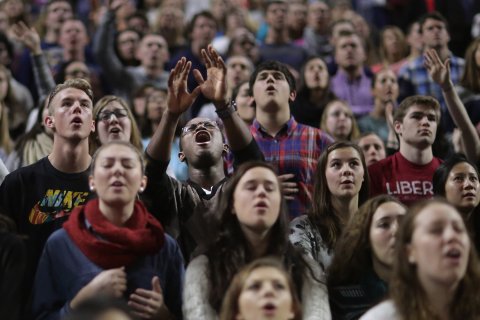
But that still leaves the question of how evangelicals were able to embrace Trump. In 2011, a poll asked respondents to agree or disagree with the statement that someone who commits an immoral act in private life could still perform well in a public position. Among white evangelicals, only three in 10 thought it was possible. In 2016, the pollsters asked the same question—and 71 percent of white evangelicals agreed. "White evangelical Protestants went from being the group least likely to agree that this was possible to being the most likely to agree," Jones says. "In one way of thinking, Trump turned evangelical ethics on its head, because they had been based on principles. They let the ends justify the means: We need a Republican president, and it doesn't matter how we get there."
For many fundamentalists, Trump's profligate dissembling and decades of dissipation are further proof that their Lord moves in mysterious ways. White evangelical supporters excuse Trump's long history of immoral behavior by comparing him to various biblical heroes whose lives were less than exemplary but who nonetheless did God's work. Lance Wallnau, author of a best-selling book about Trump called God's Chaos Candidate, has claimed God spoke to him and said, "Donald Trump is a wrecking ball to the spirit of political correctness."
Now comes the most presumptuous—perhaps even heretical—question a journalist could pose: What does God think of Trump, who, according to The Washington Post, has already told over 1,000 lies since he moved into the Oval Office and is on a trajectory to hit 2,000 by the end of the year?
The same digital voice analysis that measured Trump's comfort level when talking about God and the allegedly godless New York Times shows that when the president tells an obvious lie (a statement PolitiFact has determined is false) he is more relaxed than he is at most other times during his speeches and interviews.
That would seem to be a vexing problem for the faithful, since the Bible repeatedly associates lying with the devil. To cite just one of many examples in Scripture, John 8:44 (NIV) refers to Satan thusly: "When he lies, he speaks his native language, for he is a liar and the father of lies." Now recall that millions of white conservative fundamentalists who take the Bible literally are awaiting the fulfillment of its prophesy about the apocalypse—the end of days—which will feature the rise of an evil force that will briefly rule the world. He goes by many names, among them the Prince of Lies.
